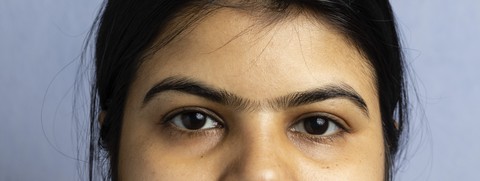A unibrow is a common genetic trait whose presence (or lack thereof) is embedded into our DNA. The phenomenon has no specific known cause and is pretty widespread; however, many people are making the conscious decision to remove it, whether for aesthetic or practical reasons. Among the many unibrow removal methods, shaving seems to be the easiest, quickest, and most painless; however, does it make the hair grow back thicker?
Shaving a unibrow does not make it grow back thicker; however, new growth often appears darker for two reasons – the root of the hair is always coarser than the tip, and the new hair hasn’t been exposed to sunlight or facial products that naturally lighten it over time.
If you’re interested in learning more about how effective shaving is as a unibrow removal method, make sure to read on. Below, I’ll also go over some of the best alternative approaches for removing a unibrow, so you’ll want to stick around until the end for this one.

Is Shaving Effective for a Unibrow?
Shaving is a pretty effective short-term hair removal method; however, if you’re playing the long game, chances are you’ll have better luck with some of the alternative approaches mentioned in the following section.
That’s because shaving only removes hair at a surface level, meaning that the actual hair follicle is left intact. As a result, chances air that the hair will end up growing back pretty quickly, making you repeat the process several times a week (especially if you want a smooth, stubble-free appearance).
Speaking of stubble, the fact that the hair follicle is left intact also leads to a blunter appearance. No matter how close of a shave you get, there’ll still be some hairs poking out of the skin. Their dark roots will show, leading to the appearance of an overall darker area that’ll only get more noticeable with time.
That’s why I previously mentioned that shaving isn’t the best long-term approach when it comes to removing your unibrow. However, if you’re in a pinch and are worried about what a razor can do to your face, the good news is you don’t have to worry.
Shaving your unibrow can work wonders in an emergency or two, and it won’t affect long-term hair growth. However, if you’re looking for a more effective method you can rely on for years to come, I recommend considering an approach that removes the hair from the root.
With that said, I want to note that all hair removal methods come with several potential side effects, so if your skin is particularly sensitive and can’t withstand too much pulling, plucking, or harsh chemicals being layered on top of it, shaving might just be your best bet. Always prioritize your comfort and safety over anything else.
If you find yourself in this position and are set on shaving your unibrow, there are a few steps you can take to make the process more effective.
- Only use clean, sharp razors. Clean the razor with rubbing alcohol before and after every use and change it periodically to ensure it stays sharp.
- Use a shaving gel or cream. Lubricating the skin beforehand can help greatly reduce irritation.
- Shave in the direction of hair growth, not against it. That way, you help prevent stubble and ingrown hair.
- Be gentle. As long as you followed step #1, you shouldn’t have to apply too much force to get the job done.
- Rinse with cool water. Doing so helps soothe the skin and prevent irritation.
- Moisturize. Shaving can severely dry up your skin, so make sure to moisturize it not only best ways to remove a unibrow.
Though these steps can help make shaving a unibrow more effective, remember that this is more of a “last resort” solution and that, if possible, it’s best to opt for an alternative approach. Let’s explore some of your best options.
Alternative Unibrow Removal Methods
Here are some of the best unibrow removal methods you can try instead: (remember that each of these has its own advantages and drawbacks, so proceed at your own discretion)
- Plucking
- Waxing
- Threading
- Using a depilatory cream
- Lasering
Conclusion
Shaving a unibrow doesn’t make it grow back thicker; however, chances are that new growth will appear darker due to the fact that the hair’s base is bigger than its tip and the fact that it hasn’t been exposed to naturally lightening agents like sunlight and facial cream.
With that said, shaving is still not the best long-term unibrow removal approach, as it can lead to a darker appearance and the hair will likely end up growing back in a matter of days. Plucking, waxing, threading, and using depilatory creams are all better eyebrow hair removal methods.
